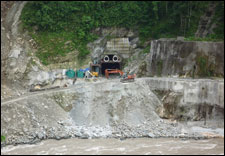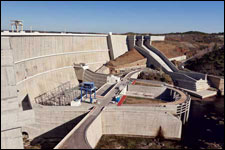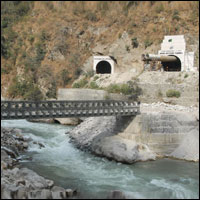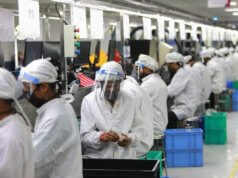 At the end of Financial Year 2012-13 India’s hydro power generation capacity was 39,491.40 MW out of total installed capacity of 223,343.60 MW, the rest coming from the thermal, nuclear and renewable energy sources. The share of hydro power in the energy sector has declined from 43.50% in 1969-70 to 17.68% as on 31st March 2013. The share of hydro power in the total installed capacity is expected to go down further if one considers the projections given by Central Electricity Authority (CEA) in National Electricity Plan on Generation. As per that document 12th Plan envisages Capacity addition of 79,690 MW out of which the hydro power share is 9,204 MW, thermal power’s share is 67686 MW and nuclear power’s share is 2,800 MW. Besides this, 18,500 MW has been targeted for renewable energy like wind and solar for development during 12th plan period.
At the end of Financial Year 2012-13 India’s hydro power generation capacity was 39,491.40 MW out of total installed capacity of 223,343.60 MW, the rest coming from the thermal, nuclear and renewable energy sources. The share of hydro power in the energy sector has declined from 43.50% in 1969-70 to 17.68% as on 31st March 2013. The share of hydro power in the total installed capacity is expected to go down further if one considers the projections given by Central Electricity Authority (CEA) in National Electricity Plan on Generation. As per that document 12th Plan envisages Capacity addition of 79,690 MW out of which the hydro power share is 9,204 MW, thermal power’s share is 67686 MW and nuclear power’s share is 2,800 MW. Besides this, 18,500 MW has been targeted for renewable energy like wind and solar for development during 12th plan period.
|
|||||||||||||||||||||||||||||||||||||
India has an estimated hydro power potential of about 150,000 MW of which only about 39,491.40 MW (as on 31.03.2013) has been commissioned so far. Majority of the un-harnessed potential is located in the hill states of Himachal, Uttarakhand, Arunachal Pradesh and Sikkim. Despite having such huge hydro power potential, deteriorating hydro-thermal mix in the total generation capacity in the country is a matter of concern for policy makers.
According to the Power Ministry the main reasons for this downward trend (in the share of hydro power in country’s overall installed capacity) is slower pace of growth of hydro projects i.e. development cycle of hydro is 8-12 years vis-à-vis 4-5 years for thermal. Reasons for such slow process of development of hydro electric projects are many and at least some of them are avoidable. According to NHPC the main reasons for delay in implementing hydro power projects are stringent environment and forest clearance policies of the government, problems relating to land acquisition, geological uncertainties, interstate and international river disputes and natural calamities.
Acc ording to Central Electricity Authority there are Detailed Project Reports of 37 hydro electric schemes which have been concurred by it but still have not been taken up for development due to various reasons. CEA lists out various reasons like non-issuance of Environment & Forest (E&F) clearance, non-signing of PPAs and absence of financial closure due to which these projects have failed to make any progress. Often CEA has been blamed for delay in implementing hydro electric projects in the country as the Authority usually takes much longer time to issue concurrence of DPRs than is necessary. However, CEA has been denying these allegations and is putting the blame on other government agencies and project developers for the delay. According to CEA, it has accorded concurrence to 30 DPRs in the last six years and has been issuing concurrence to 4-5 DPRs every year despite having limited staff.
ording to Central Electricity Authority there are Detailed Project Reports of 37 hydro electric schemes which have been concurred by it but still have not been taken up for development due to various reasons. CEA lists out various reasons like non-issuance of Environment & Forest (E&F) clearance, non-signing of PPAs and absence of financial closure due to which these projects have failed to make any progress. Often CEA has been blamed for delay in implementing hydro electric projects in the country as the Authority usually takes much longer time to issue concurrence of DPRs than is necessary. However, CEA has been denying these allegations and is putting the blame on other government agencies and project developers for the delay. According to CEA, it has accorded concurrence to 30 DPRs in the last six years and has been issuing concurrence to 4-5 DPRs every year despite having limited staff.
According to CEA often the quality of DPRs leaves a lot to be desired. CEA is also of the opinion that with the advent of the private players in the sector, the quality of DPR has gone down further. In fact, most private developers submit a skeletal report just for the sake of meeting milestones deadlines.
|
|||||||||||||||||||||||||||||||||
NHPC, country’s largest hydropower developer, feels that stringent government policies and norms to get environment and forest clearance and clearance from National Board for Wild Life lead to delay in implementing power project. In many cases projects face delay due to protests by locals who oppose the project because of environment damage likely to be caused by the project or insufficient compensation for land lost by them. In North Eastern region, often logistic bottlenecks have hampered the movement of officials and equipment and thus lengthening the period of implementation.
Government’s efforts like setting up Task Force on Hydro Project Development headed by the Minister of Power have failed to yield desired results so far. Steps taken for expediting project construction as well as for obtaining necessary statutory clearances from various Central Ministries / States for increasing the production of hydro-electricity have also proved to be futile. Therefore, there is an urgent need to take a holistic view of the entire issue and device appropriate measures accordingly.











